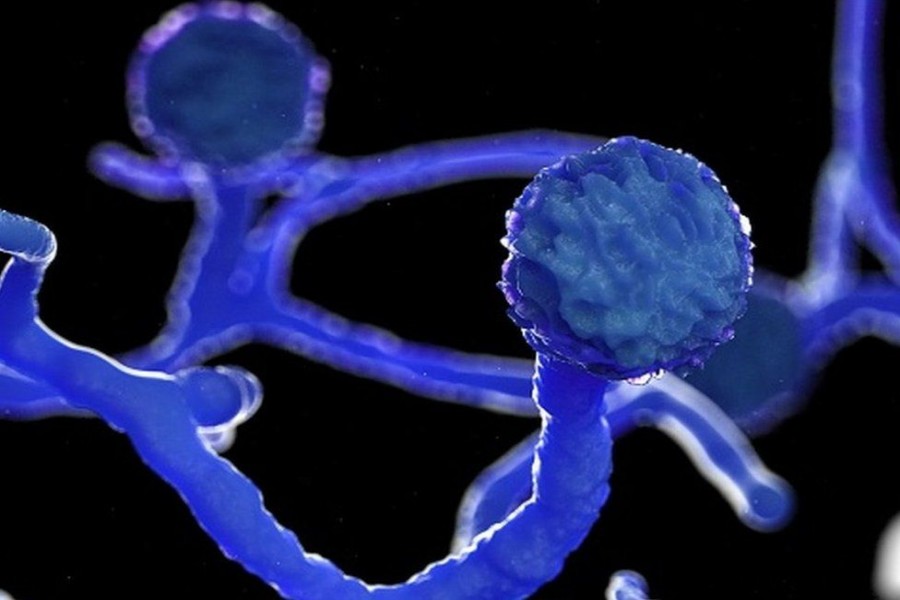On Saturday morning, Dr Akshay Nair, a Mumbai-based eye surgeon, was waiting to operate on a 25-year-old woman who had recovered from a bout of Covid-19 three weeks ago.
Inside the surgery, an ear, nose and throat specialist was already at work on the patient, a diabetic.
He had inserted a tube in her nose and was removing tissues infected with mucormycosis, a rare but dangerous fungal infection. This aggressive infection affects the nose, eye and sometimes the brain.
After his colleague finished, Dr Nair would carry out a three hour procedure to remove the patient's eye.
"I will be removing her eye to save her life. That's how this disease works," Dr Nair told me.
Even as a deadly second wave of Covid-19 ravages India, doctors are now reporting a rash of cases involving a rare infection - also called the "black fungus" - among recovering and recovered Covid-19 patients.
What is mucormycosis?
Mucormycosis is a very rare infection. It is caused by exposure to mucor mould which is commonly found in soil, plants, manure, and decaying fruits and vegetables. "It is ubiquitous and found in soil and air and even in the nose and mucus of healthy people," says Dr Nair.
It affects the sinuses, the brain and the lungs and can be life-threatening in diabetic or severely immunocompromised individuals, such as cancer patients or people with HIV/AIDS.
Doctor believe mucormycosis, which has an overall mortality rate of 50%, may be being triggered by the use of steroids, a life-saving treatment for severe and critically ill Covid-19 patients.
Steroids reduce inflammation in the lungs for Covid-19 and appear to help stop some of the damage that can happen when the body's immune system goes into overdrive to fight off coronavirus. But they also reduce immunity and push up blood sugar levels in both diabetics and non-diabetic Covid-19 patients.
It's thought that this drop in immunity could be triggering these cases of mucormycosis.
"Diabetes lowers the body's immune defences, coronavirus exacerbates it, and then steroids which help fight Covid-19 act like fuel to the fire," says Dr Nair.
Dr Nair - who works in three hospitals in Mumbai, one of the worst-hit cities in the second wave - says he has already seen some 40 patients suffering from the fungal infection in April. Many of them were diabetics who had recovered from Covid-19 at home. Eleven of them had to have an eye surgically removed.
Between December and February, just six of his colleagues in five cities - Mumbai, Bangalore, Hyderabad, Delhi and Pune - reported 58 cases of the infection. Most of the patients contracted it between 12 to 15 days after recovery from Covid-19.
Mumbai's busy Sion Hospital has reported 24 cases of the fungal infection in the past two months, up from six cases a year, according to Dr Renuka Bradoo, head of the hospital's ear, nose and throat wing.
Eleven of them had to lose an eye, and six of them died. Most of her patients are middle-aged diabetics who were struck down by the fungus two weeks after recovering from Covid-19. "We are already seeing two to three cases a week here. It's a nightmare inside a pandemic," she told me.
In the southern city of Bengaluru, Dr Raghuraj Hegde, an eye surgeon, tells a similar story. He has seen 19 cases of mucormycosis in the past two weeks, most of them young patients. "Some were so sick that we couldn't even operate on them."
Doctors say they are surprised by the severity and the frequency of this fungal infection during the second wave, compared to some cases during the first wave last year.
Dr Nair says he has come across not more than 10 cases in Mumbai in the past two years. "This year is something different," he says.
In Bengaluru, Dr Hegde had never seen more than one or two cases a year in over a decade of practice.
Patients suffering from the fungal infection typically have symptoms of stuffy and bleeding nose; swelling of and pain in the eye; drooping of eyelids; and blurred and finally, loss of vision. There could be black patches of skin around the nose.
Doctors say most of their patients arrive late, when they are already losing vision, and doctors have to surgically remove the eye to stop the infection from reaching the brain.
In some cases, doctors in India say, patients have lost their vision in both eyes. And in rare cases, doctors have to surgically remove the jaw bone in order to stop the disease from spreading.
An anti-fungal intravenous injection which costs 3,500 rupees ($48) a dose and has to be administered every day up to eight weeks is the only drug effective against the disease.
One way to stall the possibility of the fungal infection was to make sure that Covid-19 patients - both in treatment and after recovery - were being administered the right dose and duration of steroids, says Dr Rahul Baxi, a Mumbai-based diabetologist.
He says he treated some 800 diabetic Covid-19 patients in the past year, and none of them contracted the fungal infection. "Doctors should take care of the sugar levels after the patients are discharged," Dr Baxi told me.
A senior government official says there is "no big outbreak". Yet it is difficult to say why a growing number of cases of mucormycosis are being reported from all over the country. "The strain of the virus appears to be virulent, sending blood sugars soaring to very high levels. And strangely, the fungal infection is affecting a lot of young people," says Dr Hegde.
His youngest patient last month was a 27-year-old man, who was not even a diabetic. "We had to operate on him during his second week of Covid-19 and remove his eye. It's pretty devastating."


